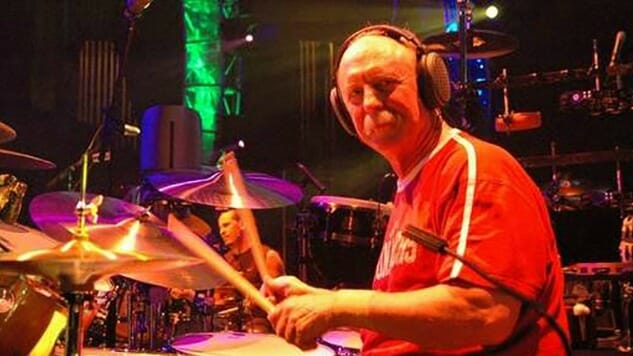Butch Trucks: The Crankshaft in The Allman Brothers’ Engine

The Allman Brothers Band was justly famous for its twin lead guitarists — whether the original duo of Duane Allman and Dickie Betts or the final duo of Warren Haynes and Derek Trucks. But just as important to the band’s sound was the interaction of the band’s two original drummers: Claude “Butch” Trucks and Jai Johanny “Jaimoe” Johanson. Much as Allman and Betts improvised single-note melodies that were markedly different but fit together in a give-and-take dance, Butch Trucks and Johanson did the same with rhythm patterns.
The 69-year-old Trucks died Tuesday evening after apparently shooting himself in the head with a pistol in West Palm Beach, Florida. It was a terrible end to a long life filled with music that will be listened to for decades to come.
Only half of the six musicians who launched The Allman Brothers Band in 1969 were still in the group when it officially retired in 2014: Gregg Allman, Trucks and Johanson. Duane and Berry Oakley had died in eerily similar motorcycle accidents in the same Macon, Georgia, neighborhood 13 months apart in 1971 and 1972, and Betts was fired by the rest of the band in 2000. Except for the nadir years of 1980-82, when Johanson quit, the two percussionists and lead singer/organist Gregg were the only constants in the band’s long history.
It would have made no sense to have two drummers if they played exactly the same or if they played totally different. But Trucks and Johanson, though they came from dissimilar backgrounds and had unlike strengths, found common ground in the new band’s unprecedented blend of Southern blues and country and improvisatory jazz.
“We all had such diverse backgrounds,” Trucks told me in 2001. “My background was classical tympani, and then I was playing folk-rock. Duane and Gregg grew up on R&B and the blues. Jaimoe grew up on R&B and jazz. Dickey grew up playing country and country-rock. But when we put it all together, we came up with something different.”
Each drummer supplied a different part – Trucks emphasized the kick drum and toms in his lower-range power attack, while Johanson emphasized the snare, cymbals and timbales in his higher-range in-the-pocket syncopation. But somehow they locked together in a propulsive momentum that sent the guitars gliding forward. A lot of fans heard only the surging motion of Duane and Dickie, but the fuel for that liftoff came from Trucks and Johanson.
“Those first couple of years, we all got drawn into jazz that Jaimoe brought,” Trucks added. “We made a conscious decision to not listen to our peers like The Grateful Dead or Jefferson Airplane. Instead we got turned on to Miles Davis, John Coltrane, Roland Kirk, Thelonious Monk and Herbie Hancock. We saw how our exposure to that music gave our own music a real jazz looseness and an exploratory attitude.”
-

-

-

-

-

-

-

-

-

-

-

-

-

-

-

-

-

-

-

-

-

-

-

-

-

-

-

-

-

-

-

-

-

-

-

-

-

-

-

-








































